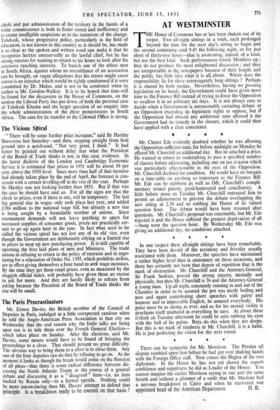AT WESTMINSTER
THE House of Commons has at last been shaken out of its torpor. Two all-night sittings in a week, each prolonged beyond the time for the next day's sitting to begin and the second continuing until 9.45 the following night, or for just short of thirty-two hours—that is awakening, indeed, of a kind, but not the best kind. Such performances knock Members up ; they do not produce the most enlightened discussion ; and they are unreportable in the newspapers because of their length, and the public has little idea what it is all, about. Where does the responsibility lie for these extravagantly long sittings ? Perhaps it is shared by both parties. Nevertheless, having no pressing legislation on its hands, the Government could have given more time to the Finance Bill instead of trying to force the Opposition to swallow it in an arbitrary six days. It is not always easy to decide when a Government is unreasonably curtailing debate or an Opposition exceeding its legitimate rights to oppose, but if the Opposition had abused any additional time allowed it the Government had its remedy in the closure, which it could then have applied with a clear conscience.
* * * * Mr. Chuter Ede evidently doubted whether be was allowing the Opposition sufficient time, for before midnight on Monday he offered Mr. Churchill an additional day. But he attached a price. He wanted in return an undertaking to pass a specified number of clauses before adjourning, including one on tax evasion which was particularly objectionable in the eyes of the Opposition. Mr. Churchill declined the condition. He would have no bargain on a time-table on anything so important as the Finance Bill. Mr. Ede can be stubborn as well as (Mr. Churchill's compli- mentary terms) patient, good-humoured and conciliatory. A little before noon on Tuesday Mr. Churchill entreated him to permit an adjournment to prevent the debate overlapping the new sitting at 2.30 and so robbing the House of its valued question hour. The debate would have been resumed after questions. Mr. Churchill's proposal was reasonable. but-Mr. Ede rejected it and the House suffered the greatest deprivation of all —bang went the question hour. By Wednesday Mr. Ede was giving an additional day, no conditions attached.
* * * * In one respect these all-night sittings have been remarkable. They have been devoid of the acrimony and frivolity usually associated with them. Moreover, the speeches have maintained a rather higher level than is customary on these occasions, and there has certainly not been that degree of repetition that is the mark of obstruction. Mr. Churchill and the Attorney-General. Sir Frank Soskice, proved the strong stayers, mentally and physically, but then Mr. Churchill is 76 and the Attorney-General a young man. Up all night, constantly running in and out of the Chamber in order to be assured the pot was nicely boiling and now and again contributing short speeches with gaiety and humour and in impeccable English. he amazed everybody. His pulse must be as strong as ever, and as for his mental virility it proclaims itself unabated in everything he says. At about three o'clock on Tuesday afternoon he could be seen rubbing his eyes with the ball of his palms. Boys do this when they are sleepy. But this is no mark of tiredness in Mr. Churchill. it is a habit. He is just perfecting the vision for the next round.
* * * * There can be sympathy for Mr. Morrison. The Persian oil dispute tumbled upon him before he had got over shaking hands with the Foreign Office staff. Now comes the Hegira of the two diplomats. In the House he has not yet shown the superb confidence and suppleness he did as Leader of the House. You cannot imagine the earlier Morrison saying in one and the same breath and without a glimmer of a smile that Mr. Maclean had a nervous breakdown in Cairo and when he recovered was appointed head of the American Department. H. B.


































 Previous page
Previous page